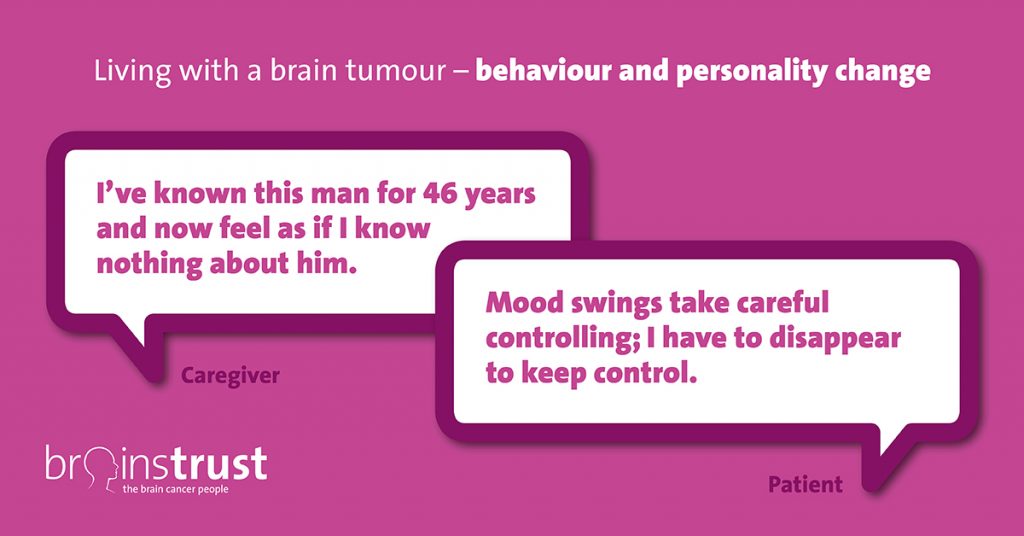
For both people with a brain tumour and their families, behaviour and personality change can be confusing, scary and feel overwhelming.
We’ve put together some simple tips to help you feel less afraid and more in control. For more in-depth support when dealing with behaviour and personality change, try our resource, or speaking to your support specialist. You’re not on your own!
- Recognise that your struggle is valid, no matter what you’re struggling with.
Don’t be ashamed of how you feel – you’re not the first to have felt like this, and you won’t be the last. Talk to others about the way you feel.
- Don’t do it alone.
One thing resilient people do is seek support. They build a team around them and seek help from them when they need it.
- Know your sanctuary.
You may not be able to fix the problem, but you can protect yourself from being overwhelmed by the situation. Know your escape and use it often. It doesn’t have to be anything remote, hard to access or expensive. It could be a walk in the sun, an hour with a good book, listening to music or phoning a friend and talking about anything at all. Learn how to take a mental break.
- Be kind to yourself.
By learning to cope with negative feelings and having that experience, we grow in confidence and in preparation. It’s easier to see all the things that feel impossible, rather than all of the things you have achieved. Try to view yourself as someone who is better prepared for life’s stressors, as you have already lived through so much.
- Walk away – for a short time.
If you’re angry and frustrated, change to a different physical space. If you get upset, take deep breaths and count to 10. If it’s safe, leave the room for a few minutes.
- Don’t ask questions.
In the middle of conflict or times of stress, try and keep your language simple, and don’t ask questions. When someone is agitated, they cannot take on more. Instead, reassure and let them know they are safe.
- Make the day manageable.
Pace yourselves, and run through the plan for the day in the morning. There might still be surprises that pop up, but you have prepared for them as much as you can.
- Breathe.
If you know you are upset, lift your head up and breathe in slowly for a count of four, and then out for a count of five. Do this two or three times. Make sure you are breathing into your belly. Place your hand on your belly and breathe so that you can feel it move in and out. This stops shallow breathing, which causes stress.
If you think mindfulness might help you, have a look at this list of the 12 best mindfulness apps.
- Move and hug yourself.
Just moving to a different physical space and looking out of a window can shift a dynamic. Wrap your arms around yourself and self-hug.
- Tell yourself this will pass.
Remind yourself that this moment will pass. You cannot be a state of agitation forever. Stop the chatter in your head and ask yourself ‘what’s my goal here?’.
We can help you through it. Give us a call on 01983 292 405 to speak to someone that understands.









